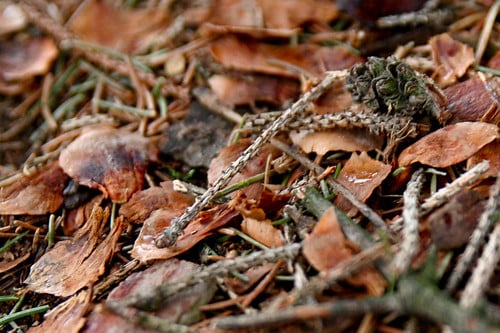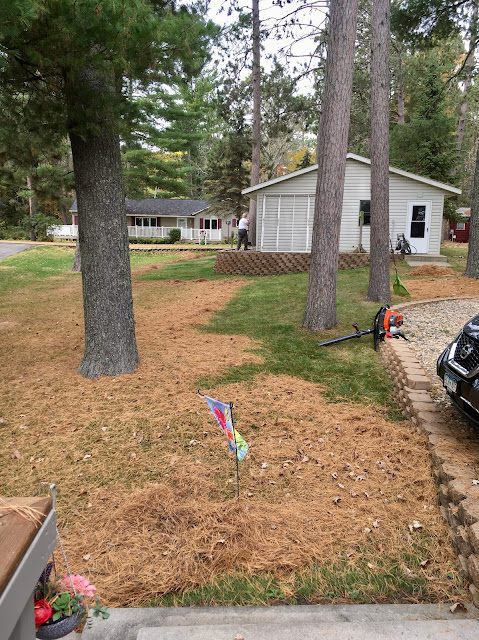
If you’ve ever wondered, “Do pine needles kill grass?” then you’re not alone. This is a common question that many gardeners and homeowners grapple with. The answer isn’t as straightforward as one might think.
Pine needles, or pine straw, can have both positive and negative effects on your lawn’s health. On one hand, they act as a natural mulch that helps to retain soil moisture and prevent weed growth. But on the flip side, an excessive layer of pine needles can block sunlight from reaching the grass underneath which may lead to its decline over time.
Moreover, it’s widely believed that the acidic nature of pine needles could harm your grass by altering soil pH levels – but this isn’t entirely accurate! While it’s true that fresh pine needles are slightly acidic when they drop from the tree; however they don’t significantly alter soil pH levels once decomposed in most cases. So if you’re worried about acidity affecting your lawn health due to these needle droppings – chances are there’s no need for concern!
Understanding the Effects of Pine Needles on Grass
Ever wondered if pine needles could be harmful to your lawn? It’s a common question, particularly for those who have pine trees in their garden. Let’s delve into this topic and understand how these seemingly harmless tree droppings can affect your grass.
Firstly, it’s essential to grasp that pine needles are acidic. They possess a pH level between 3.2 and 3.8 when fresh, making them quite acidic compared to other organic materials found in gardens. Over time though, as they decompose, the acidity lessens considerably.
Does this mean they’ll kill your grass? Well not necessarily! Many people assume that because of their acidity levels initially being high, spreading them over lawns would lead to adverse effects such as browning or even death of the grass due to an increase in soil acidity (pH). However it isn’t that straightforward.
Here is some data illustrating typical pH levels for different types of soil:
| Soil Type | Typical pH |
|---|---|
| Sandy | 6 -7 |
| Loamy | 6-7 |
| Clayey | 5-6 |
What you need to know is: most types of grasses thrive best within a neutral pH range i.e., around 6 -7 but can tolerate slightly more acidic conditions too down till about pH level 5 without much detriment.
Pine needles may make your lawn seem untidy but contrary what you might think; they don’t dramatically alter the soil’s PH significantly enough so as cause harm unless there is an overwhelming amount present over long periods.
In fact, letting some fallen pine needles remain on lawns can actually have benefits! These include providing valuable nutrients like nitrogen back into the soil during decomposition process helping improve its overall fertility while also acting as mulch by retaining moisture reducing water loss from evaporation during hot summers thereby indirectly benefiting your green carpet!

Conclusion: Do Pine Needles Really Kill Grass?
So, you’ve been wondering if pine needles can actually kill your grass. Let’s break it down for you.
Firstly, the acidity of pine needles is often pointed out as a potential hazard to grass. However, this isn’t entirely accurate. While fresh pine needles have an acidic pH, once they decompose and mix into the soil, their acidity decreases significantly.
But that doesn’t mean that a thick layer of pine needles won’t harm your lawn in some way! If left unchecked, these fallen fragments could block sunlight from reaching the underlying grass blades – not ideal for photosynthesis or growth!
Also worth noting is how water permeates through this natural barrier – yes we’re talking about those pesky pine needle layers again! It may hinder rainfall from soaking into the ground effectively which means your beloved lawn might be missing out on essential hydration.
Now let’s talk numbers:
| Factors | Impact on Grass |
|---|---|
| Acidity of Decomposed Pine Needles | Low |
| Sunlight Blockage due to Thick Layers | High |
| Water Permeation Hindrance due to Layers | Medium |
So where does this leave us? Well…
- Freshly fallen and accumulating layers of pine needles can potentially impact your lawn negatively.
- This effect isn’t so much related directly to their acidic nature but rather their tendency when layered heavily to block sunlight and restrict effective watering.
- Regular raking or mulching with decomposition in mind will help alleviate these issues.
Ultimately though don’t lose sleep over it! Your verdant garden needn’t fear occasional pines dropping their quills onto its surface; just keep up regular maintenance (which you’d do anyway right?) In essence then: no, contrary to popular belief – pine needles don’t inherently kill grass.
Troy Channer is a seasoned professional with over a decade of experience in the construction industry, specializing in residential projects and road infrastructure networks. His expertise spans a broad range of skills, including proficiency in Microsoft Excel, Word, and PowerPoint, which he adeptly uses to streamline operations and enhance productivity.
Troy’s commitment to excellent customer service is a cornerstone of his professional philosophy, always prioritizing client satisfaction and fostering strong relationships. His leadership skills are well-recognized, and he has a proven track record of managing teams to deliver high-quality results.
In addition to his construction experience, Troy is also the proud owner of a successful landscape company based in Oakville. This venture allows him to apply his extensive knowledge of civil engineering and project management to create beautiful and sustainable outdoor spaces for his clients.
Troy holds an Advanced Diploma in Civil Engineering Technology from Humber College, further solidifying his credentials as a highly skilled operations professional in the industry. His combined experience and education make him a versatile professional capable of tackling a wide range of projects.








